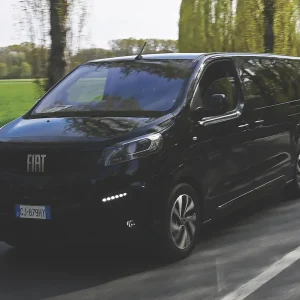The most important element of fuel management is buying the right vans for your fleet in the first place, so says Nigel Trotman, head of strategic consultancy at Alphabet.
“Are the vehicles fit for purpose?” he asks, and adds that many firms are looking at downsizing their vans, but only if they can still maintain the same service with smaller models.
Once you’ve got the right vans, Trotman says you should look at how and where your drivers purchase fuel.
Fuel cards can provide vital data about the most efficient (and wasteful) drivers and where they are filling up – motorway service stations, for example, are far more expensive than supermarket forecourts.
Telematics systems, meanwhile, can help to identify the most economical routes and supply data about a driver’s performance.
“It’s the Big Brother element – is the driver going where they should?” says Trotman.
Van owners can make big cuts in their fuel bills if they are willing to adopt a few sensible measures, says Mark Cartwright, head of vans and light commercial vehicles at the Freight Transport Association (FTA).
“I don’t think it would be difficult for most operators to reduce their fuel consumption by 15-20%,” he contends. “Fitting a speed limiter alone will get you an 8-10% saving.”
Installing a rev limiter can help hold down fuel costs too, and may make more sense if you are mainly on stop-start urban work.
Merely inflating a van’s tyres to the correct pressure can garner a fuel saving. Run around with them under-inflated by just one bar (15psi) and your fuel usage will go up by about 6%.
Then there is the simple act of inspecting the load area and taking out all the tools, parts and bits of junk that you threw in there in case you needed them but never have. Encumbering a light commercial with unnecessary weight will always bump up the fuel bill, and that unnecessary weight could include a roof rack that’s seldom used – as well as adding weight, it creates aerodynamic drag.
“The heavier the vehicle the more fuel it will use,” says Trotman.
Ensure that your van is serviced regularly in line with manufacturer recommendations too, as skipping services does no favours for mpg.
Sending staff on courses that show them how to drive more frugally can help, but some respond better than others, and even the performance of those who respond well sometimes tails off in the following months, Cartwright says. They are, however, less likely to do so if their performance is continually monitored, he suggests.
Trotman agrees that the benefits of driver training can wane over time but contends that even if the fuel savings tail off from about 20% per driver to 5% they can still be significant. He adds that fleets can encourage drivers to maintain good habits by instilling an element of competition and rewarding the most economical drivers.
One way of monitoring them is to install a telematics monitoring system. It consists of an in-cab unit that alerts staff – typically with a red light on a traffic light-style display – if they are driving inefficiently. This includes speeding, harsh acceleration and aggressive cornering. The data the unit records can be downloaded subsequently so the fleet manager can discuss it with the driver concerned.
Telematics can also be employed in other ways.
“One major fleet operator has realised a 12% saving simply by investing in 100 off-the-shelf satnavs and instructing drivers to plan their routes and use the built-in fuel price function to identify the cheapest fuel within three miles when they need to fill up,” Cartwright says. The drivers receive 50% of any money saved.
Encouraging employees to fill up at cheaper petrol stations such as supermarket forecourts by allowing them to retain any incentive points earned by doing so is worth considering, just so long as it does not lead to them driving miles out of their way to get to the nearest branch of Tesco.
Perhaps the most surprising thing is that a large number of operators fail to implement policies that would cut their fuel bills, says Cartwright.
“A recent survey of the FTA’s van-operating members revealed that almost half didn’t measure fuel consumption, only a quarter planned their routes, and a third didn’t train their drivers in fuel-efficient driving,” he observes. Speed-limiters were, however, in widespread use.
Fuel cards have the advantage that they can generate the sort of invoice that is accepted by Her Majesty’s Revenue and Customs for VAT reclamation purposes, says Jakes de Kock, marketing director at The Fuelcard Company. “It makes it easier to claim back 100% of what you are entitled to,” he says.
Cards can also be restricted to fuel-only so drivers cannot use them to purchase other items such as cigarettes, confectionery and magazines.
The Fuelcard Company can issue van operators with cards costing from £6-12 apiece annually, which allow them to purchase diesel at well over 1000 forecourts UK-wide at wholesale prices offering a typical 4-5p a litre saving over retail, says de Kock.“That can increase to 9p a litre if you buy at motorway service areas,” he adds.
The minimum per account monthly purchasing requirement is £300 and the credit terms offered mean that users typically pay for their fuel 14 days after they have taken it.
In the current economic climate some businesses may be viewed as insufficiently credit-worthy to be supplied with fuel cards. As a consequence The Fuelcard Company has developed a pre-paid alternative.
Further savings of around 0.5-1p a litre can be achieved if operators opt for bunkering, where firms purchase diesel in bulk every month that their drivers can then draw from selected forecourts after showing a suitable card. “The quantities you have to buy to make this work for you, however, mean that it is only suitable for really big fleets,” de Kock contends.
As already intimated, looking at likely fuel usage should be among the top priorities for businesses when considering which vans they should buy as replacements. A number of light commercial manufacturers offer low-consumption and low-CO2 derivatives of their mainstream models, and many vans are also up for grabs with stop/start systems, which automatically kill the engine if it is allowed to idle wastefully in These are optional in some cases, but it’s worth adding up the potential savings, depending on how the vehicle will be used, to see if it’s worth the extra up-front cost.
Combine this with a package such as Vauxhall’s Ecoflex and the impact on fuel economy can be astonishing. For example, Vauxhall’s 95hp diesel Corsavan 1.3 CDTi Ecoflex Start/Stop burns a mere 78.3mpg on the combined cycle – it’s the sort of figure guaranteed to make an oil sheik weep, and when combined with some if not all of the measures outlined above, will have a significant impact on a business’s bottom line.





